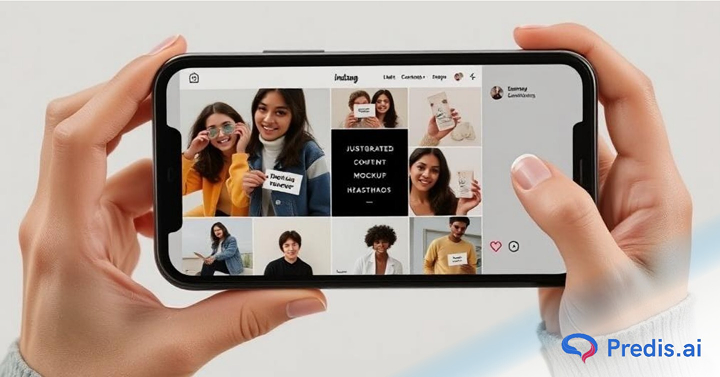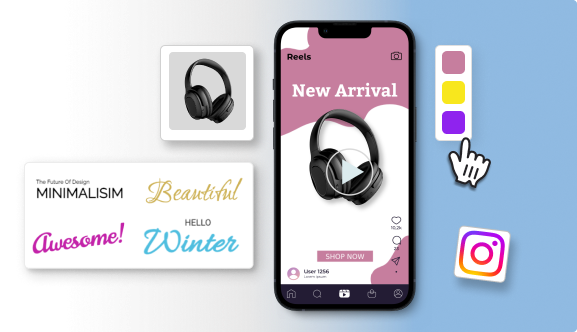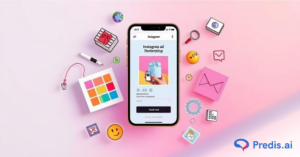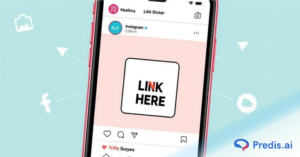Instagram is no longer just about pretty pictures. Today, it’s a powerful marketing tool for brands looking to connect with their audience. But in a world full of polished ads and influencer campaigns, one thing still stands out, authenticity.That’s where UGC or User-Generated Content comes in. UGC for Instagram Ads isn’t just smart marketing, it’s marketing powered by your real customers. In this guide, you’ll learn everything about using UGC for Instagram Ads, what it is, why it works, how to collect it, and how to turn it into high-performing ads.
What is User-Generated Content (UGC)?
User-Generated Content refers to any form of content such as photos, videos, reviews, testimonials, or stories. Real users and customers share such type of content about a brand.
UGC comes naturally from your audience. They share their experiences, feedback, or love for your product without being paid (most of the time).
It could be:
- A customer sharing an Instagram Reel unboxing your product
- A happy user leaving a review in Stories
- A foodie clicking their meal at your cafe and tagging your handle
Why is UGC a Game-Changer for Instagram Ads?
Unlike professional ad shoots, which can have a “salesy” feeling, user-generated content (UGC) gives your campaign a raw and genuine approach. UGC is useful and successful because actual users make such regular content.
- UGC is trusted by Instagram users because it has a sense of being genuine and honest.
- It shows real-life product usage.
- It creates a virtual emotional connection between people.
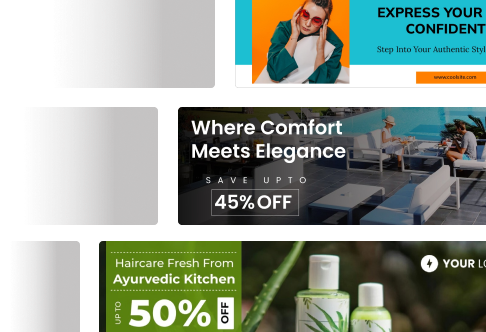
Benefits of Using UGC in Instagram Ads
1. Builds Authenticity and Trust Instantly
Currently, consumers are looking for transparency. When you see actual customers testify for your brand, it lends credibility to your advertisement. 84% of people trust peer recommendations over branded content.
2. Drives Higher Engagement Rates
When compared to standard advertisements, user-generated content advertisements achieve a higher level of engagement in terms of likes, comments, shares, and saves. People enjoy information that is less polished and more relatable.
3. Cuts Down Content Creation Cost
When it comes to content production, user-generated material can save both time and money. Rather than spending money on costly picture shoots, you make use of content that has already been provided by your audience.
4. Strengthens Brand Community
When customers see their own content featured in your advertisement, they feel recognized and valued. This not only strengthens their loyalty but also motivates others to share their experiences with your brand.
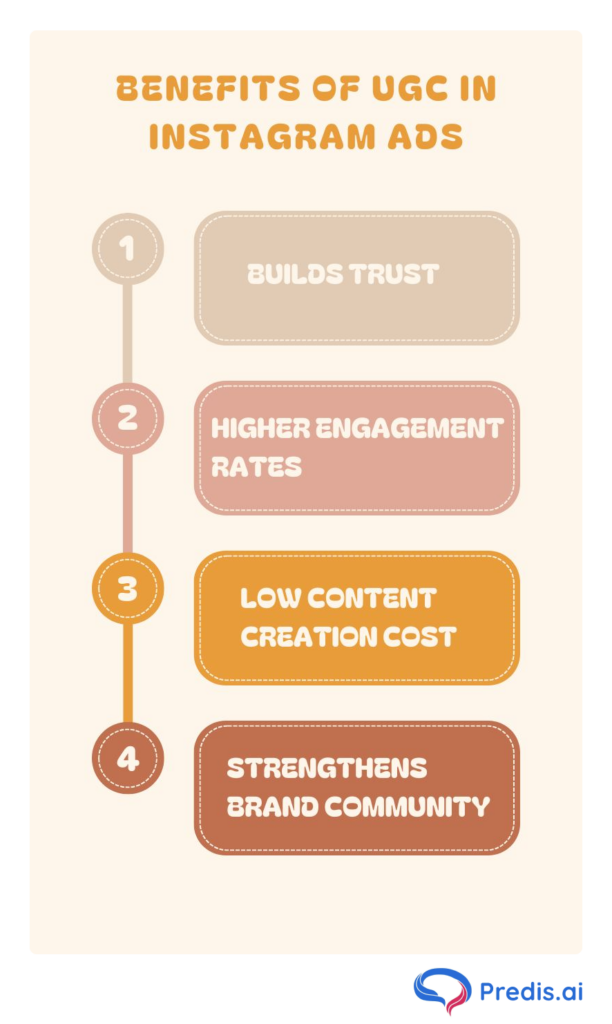
Types of UGC That Work Best for Instagram Ads
User-generated content is adaptable and can be customized to fit into any Instagram ad style, including Reels, Stories, and Carousel posts. The following are examples of popular types of user-generated content:
- Customer Reviews & Testimonials: Take a screenshot of the positive reviews left on your website, social networking platforms, or Google.
- Unboxing & Experience Videos: These raw films capture first impressions as well as details about the product from the perspective of a client watching them.
- Before & After Transformations: Ideal for cosmetics, fitness, or home decor firms that want to demonstrate their products’ effectiveness.
- User Photos & Lifestyle Reels: Customers that take pictures of themselves using your product naturally create a sense of ambition.
- Influencer-Generated UGC: Micro and nano influencers are responsible for producing material that is both trustworthy and feels personal.

How to Find and Collect UGC for Instagram Ads?
There is no such thing as luck when it comes to discovering fantastic user-generated content. In order to encourage and gather it, you need to have tactics.
1. Create a Branded Hashtag
- It should be simple for users to tag the content they create. You can promote your hashtag on the bio section of Instagram, on packaging, and even in emails.
- The #ShotoniPhone by Apple and the #AerieREAL by Aerie are two examples.
- You can create hashtags using Predis AI hashtag generator.

2. Run UGC Campaigns or Contests
- It is important to provide customers with incentives to share their experiences. You should hold contests or giveaways that have a certain theme.
- As an illustration, “Share your skincare routine with #MyGlowStory for a chance to be featured!”
3. Monitor Instagram Mentions & Tags
- Always make sure to keep an eye on the mentions and tagged posts you have. You will find a great deal of possible user-generated content here.
4. Ask for Permission
- You can ask for permission to use their content in your advertisement by sliding into direct messages or commenting on the article.
- An example of a direct message: “Hello! This is a fantastic post. Do you think it would be possible for us to include it in our Instagram advertising campaign and give you full credit for it?
5. Use UGC Tools
- To automate user-generated content discovery, rights management, and content curation. Various tools are useful such as:

Best Practices to Use UGC in Instagram Ads
- It is straightforward to create Instagram ads based on user-generated content (UGC), if you adhere to a few basic best practices.
- Choose high-quality graphics that exude authenticity rather than being contrived.
- Minimize the amount of editing done, and let it have its raw feel.
- Subtitles should be included to any reels or story ads.
- Ensure that the original creator is given credit.
- Incorporate a caption or hook that is relatable.
- Include a compelling call to action such as “Shop Now” or “Try it Yourself.”
How to Run UGC-Based Instagram Ads (Step-by-Step Guide)?
A fast guide to transforming user-generated content into excellent advertisements on Instagram is presented here.
Step 1: Choose the Appropriate User-Generated Content
It is important to select content that is in line with the objective of your campaign, whether that objective is to establish trust, educate, or convert.
Step 2: Edit Smartly
The content should be resized to accommodate the various ad placements (Stories, Feed, and Reels). If it is necessary, add the brand logo in a subtle way.
Step 3: Set Up Your Instagram Ad
- Check out the Meta Ads Manager.
- Determine the purposes of your campaign.
- Set audience targeting and upload user-generated content
- Determine your budget and positions.
Step 4: Test & Optimize
Always test a number of different user-generated content creatives to determine which ones resonate the most. Maintain a close eye on indicators such as engagement, click-through rates, and conversions.
Top Examples of Brands Using UGC for Instagram Ads
1. GoPro: Turning Customers into Storytellers
In terms of user-generated content (UGC), GoPro is a prime example. GoPro cameras are used by the company to capture the community’s adventurous moments, and the brand actively encourages its community to share these memories. These real-life photos, which range from snowboarding to skydiving, are frequently used in GoPro’s Instagram advertisements. They contribute to the brand’s feeling of authenticity and establish a powerful emotional connection with its audience.
2. Starbucks: Inspiring Creativity Through #RedCupContest
The well-known #RedCupContest that Starbucks held is what caused a stir. The brand’s holiday-themed red cups were included in the imaginative photographs that customers were encouraged to upload on social media. The most spectacular entries not only gained acclaim, but they were also used in advertising campaigns run by Starbucks, which made it possible to effortlessly combine customer creativity with promotion of the company.

3. Calvin Klein: The Power of #MyCalvins Movement
The #MyCalvins campaign that Calvin Klein ran became a widespread phenomenon on social media. The company invited its customers to relate personal and fashionable moments that they had experienced while wearing Calvin Klein items. A portion of the material was subsequently recycled as advertisements for Instagram, providing regular users with the opportunity to star alongside celebrities and influential people.
4. Apple: The #ShotOniPhone Campaign
One of the most innovative user-generated content (UGC)-driven advertising initiatives to date is Apple’s #ShotOniPhone campaign. iPhone users were encouraged to share their most memorable photographic experiences with the brand. Not only did these genuine, unaltered photographs make it into advertisements on Apple’s Instagram account, but they were also placed on billboards all around the world. Together, they demonstrated the true capabilities of an iPhone camera from the perspective of its customers.
5. Daniel Wellington: Influencer-Led UGC
Content that was contributed by users was the primary means by which Daniel Wellington expanded its social presence. A successful transformation of customer material into attractive, lifestyle-driven Instagram advertisements was achieved by the brand through the collaboration with influencers and the encouragement of customers to submit images of themselves wearing their timepieces along with branded hashtags.
Common Mistakes to Avoid While Using UGC
Even though UGC seems laid-back, don’t make these usual mistakes:
- Not getting the right permission from the author
- Using images with poor resolution or blurriness
- Changing too much and losing the “real” feel
- Not following your brand’s style or rules
- Not mentioning who made the article
Conclusion
Brands must now use User-Generated Content on Instagram; it’s no longer a choice. People believe in people more than brands. It’s also easy for UGC to build trust. Start using UGC in your Instagram ads right away if you want them to stop people in their tracks, get them to interact, and lead to sales. Get your happy customers to help you sell your business. Their words are more convincing than any written ad.


